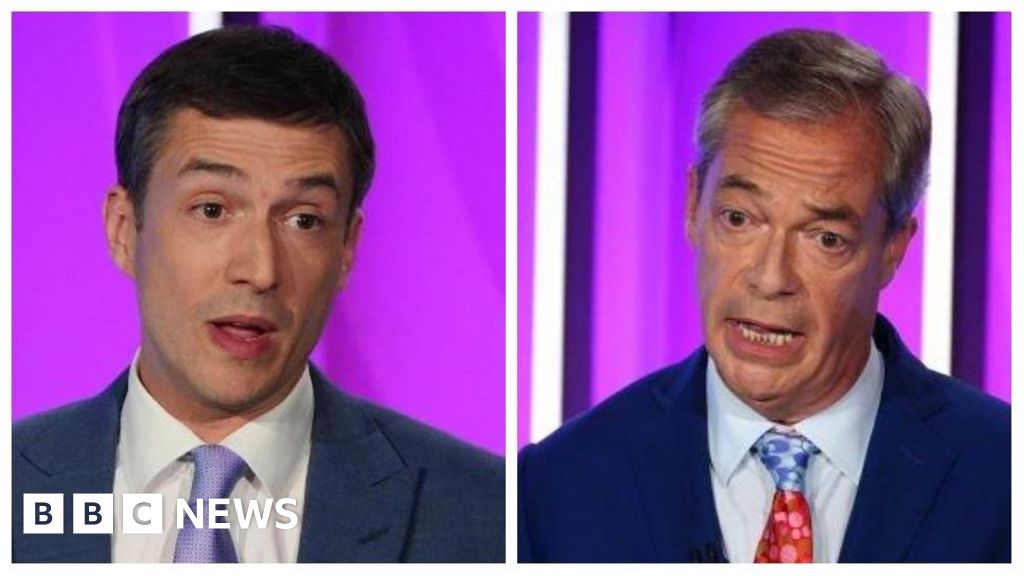World
Five key takeaways from Green and Reform leaders’ Question Time – BBC News

Green co-leader Adrian Ramsay and Reform UK’s Nigel Farage each fielded half an hour of questions from a BBC Question Time audience in Birmingham, in the final leaders’ special of this election campaign.
Just six days before voters go to the polls, the two answered questions on immigration, tax, Brexit and their parties’ candidates.
- Author, Chas Geiger
- Role, Politics reporter
Sharp contrast in leaders’ tones
There was a distinct difference in the way the two leaders responded to the studio audience.
Adrian Ramsay repeatedly began his answers with “good question” or similar – though some of his answers appeared to elicit some scepticism.
By contrast, Nigel Farage took a more combative approach. There was applause for critical questions, and when he was pressed on why some Reform candidates were still standing, his “I have no idea!” response elicited laughter in the room.
But the Reform leader seemed to relish the challenge from the Birmingham audience, saying he would not apologise for mistakes made by some candidates and activists.
Both leaders challenged about candidates
Both Mr Ramsay and Mr Farage were on the defensive when pressed about some of their election candidates who have made controversial comments, largely on social media.
Presenter Fiona Bruce pushed Mr Ramsay on some Green candidates who have been accused of making extreme comments on the Gaza conflict.
He said he did not support any of their views and concerns raised would be independently investigated, but he declined to go further.
Mr Farage appeared to withdraw support for one of his candidates live on TV, saying he “wouldn’t want anything to do with them”.
Any candidate who’s had party support withdrawn now will still appear on the ballot paper in their party’s name on 4 July.
Even the Green leader doesn’t have an electric car
While emphasising the need to improve public transport, Mr Ramsay said he had a car and used it when he needed to.
But he added it was hybrid and not fully electric – even though he would like it to be – because he lived in a terraced house where a charging point could not be installed.
Mr Ramsay argued that was an example of a lack of transport infrastructure in the UK, with expensive trains, no buses to catch in many rural areas, and too many domestic flights.
His call for the railways to be brought back into public ownership got a round of applause.
How much would a scrappage scheme to get fossil-fuel vehicles off the roads by 2035 – as set out in the party’s manifesto – cost, he was asked.
He said all Green policies were fully costed, but couldn’t specify what car owners would get to scrap their petrol and diesel vehicles.
Both leaders outspoken on foreign policy
No qualms from either leader about giving their verdict on the US presidential debate between Donald Trump and Joe Biden.
Mr Ramsay said he was very worried about the prospect of Donald Trump returning to the White House, particularly after Joe Biden’s performance.
Mr Farage said Mr Biden was a weak president and argued Mr Trump would make the world a safer place because he was a peacemaker.
And asked about the Green pledge to scrap the UK’s Trident nuclear deterrent, Mr Ramsay was repeatedly pressed about co-leader Carla Denyer’s claim that Trident made the country more of a target – but declined to use her words.
Farage doubles down on Clacton campaigners claims
Secret recordings broadcast by Channel 4 have shown a canvasser for Mr Farage using a racist slur to refer to the prime minister and another activist making a homophobic comment. The opening question to the Reform UK leader was “What is it about your party that attracts racists and extremists?”
Mr Farage didn’t apologise, saying he had done more to drive the far right out of British politics than anyone else alive and had “destroyed” the British National Party.
He reiterated his claim that the man who made the racist slur, Andrew Parker, was an actor. “This is a total and utter set-up,” he insisted.
Channel 4 has said it stands by “our rigorous and duly impartial journalism”.
Mr Farage also repeated his line that he inherited the party’s candidates, having taken over the leadership only after the election was called.







:max_bytes(150000):strip_icc()/roundup-writereditor-loved-deals-tout-f5de51f85de145b2b1eb99cdb7b6cb84.jpg)


